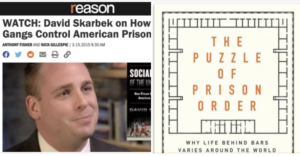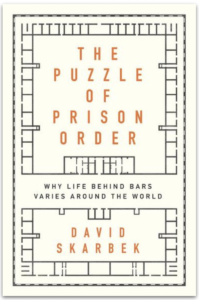Smaller, Safer, More Restorative Federal Prison Reforms
It’s time to transform our nation’s prisons. We’re supporting bold ideas to safely reduce prison populations, improve culture and conditions, increase transparency, and bolster prospects for successful reintegration.
Arnold Ventures Criminal Justice, May 15, 2019
The Arnold Ventures Criminal Justice team discusses four major problems with status quo prison and then explains their approach to resolve these problems:
Problem #1: There are too many people in prison and sentences are too long. Arnold Ventures (AV) Approach: Safely reduce incarceration.
Problem #2: Prisons are inaccessible and unaccountable. AV Approach: Increase transparency, accessibility, and accountability of prisons.
Problem #3: With excessive punishments and grim conditions, prisons are often inhumane. AV Approach: Promote dignity and improve well-being for people in prisons—including those who work in them.
Problem #4: Prisons leave people worse off. AV Approach: Improve preparation for successful reentry.
In a 2017 presentation at North Dakota’s Recovery Reinvented conference, Mark Holden outlines the need for similar reforms, “Criminal Justice Reform and Re-Entry”
Annual Recovery Reinvented conferences are recommended for the variety of criminal justice reform speakers and proposals.
Mark Holden was a senior vice president at Koch Industries and is now with Stand Together and Chairman of the Board for Americans for Prosperity.
Criminal Justice Reform is a major policy focus for Stand Together. See their page Expanding justice throughout America’s justice system. See also, from 2019 Adversaries unite to achieve historic criminal justice reform:
After years of sparring with one another on other issues, Van Jones and Mark Holden found common ground on criminal justice reform. Uniting a diverse coalition, they helped pass the historic First Step Act — which reduced some excessive punishments and expanded access to rehabilitation programs that help people successfully transition back into their communities upon release.
• • • • • • • • • • • • • • • •

Gangs are a response to too large and unsafe prisons
Economist David Skarbek, author of The Social Order of the Underworld: How Prison Gangs Govern the American Penal System (Oxford University Press, 2014), explains in the Reason interview the incentives and dynamics of prison violence and why prisons should be smaller, safer, and more effective. WATCH: David Skarbek on How Gangs Control American Prisons.
Also this 2015 TEDx presentation David Skarbek How gangs keep inmates safe | David Skarbek | TEDxWarwick

The Puzzle of Prison Order
David Skarbek’s 2020 book is The Puzzle of Prison Order: Why Life Behind Bars Varies Around the World: Why Life Behind Bars Varies Around the World (Oxford University Press, August 3, 2020).
Discussion of the book here (audio isn’t ideal at times): “Why Life Behind Bars Varies around the World” David Skarbek, Hayek Lecture Series.
Many people think prisons are all the same—rows of cells filled with violent men whom officials rule with an iron fist. Yet, life behind bars varies in remarkable ways. Drawing on economics and a vast empirical literature on legal systems, David Skarbek, associate professor of political science at Brown University, explains why life on the inside varies in such fascinating and novel ways, and also how social order evolves and takes root behind bars.
Professor Skarbek is the author of two books: The Social Order of the Underworld: How Prison Gangs Govern the American Penal System (Oxford University Press, 2014) and The Puzzle of Prison Order: Why Life behind Bars Varies around the World (Oxford University Press, 2020).
